Firestorm Coming
Clash of Civilizations Instantly, instinctively, and unrelentingly, the American establishment has framed the attacks of September 11, 2001, in the language of a clash of civilizations. The Islamic terrorists attacked America because they hate our highest values, our freedoms, our way of life, our civilization. President Bush wasted no time in defining the language of this discourse in his first speech on September 11, 2001. “Today,” he opened his speech, “our fellow citizens, our way of life, our very freedom came under attack in a series of deliberate and deadly terrorist acts.” This thesis was hammered home again. “America was targeted for attack because we're the brightest beacon for freedom and opportunity in the world.” The President informs us, “why do they hate us?” His answer is clearly stated. “They hate what we see right here in this chamber – a democratically elected government. Their leaders are self-appointed. They hate our freedoms – our freedom of religion, our freedom of speech, our freedom to vote and assemble and disagree with each other.” It is not clear anymore if ‘they’ points to al-Qaida, the Arabs or all Muslims. This then is the ideology of America’s establishment as it wages its “war against terror.” The Muslims attacked America because they hate who we are. They want to destroy us because they hate our freedom, our opportunities, our democratic institutions, our way of life, our Judeo-Christian heritage. It is a hatred that is civilizational. It is rooted in the illiberal, intolerant, misogynist, anti-modernist, and anti-scientific culture of Muslims and their religion. This thesis is now spun a thousand times every day by America’s politicians, press and pundits. The post--Cold War world is a world of seven or eight major civilizations. Cultural commonalities and differences shape the interests, antagonisms, and associations of states. The most important countries in the world come overwhelmingly from different civilizations. Power is shifting from the long predominant West to non-Western civilizations. Global politics has become multipolar and multicivilizational.  If indeed al-Qaida fails to launch another attack against American interests, on American soil or elsewhere, Americans too will begin to ask: Did the United States overreact. Worse, they might question if this war was a phony, a cover to curtail liberties, to launch preventive wars, to line the pockets of corporate executives with tens of billions stolen from American tax-payers. Have so many Americans died in vain – for a phony war? Have Americans died for Israel – to fulfill its strategic objec-tive of balkanizing, pulverizing the larger Arab states? Once Americans begin to ask these questions, the consequences could be unpredictable for Israel and for the exercise of American power in the world. References ... *Why They Hate Us *the Remaking of World Order *The Clash of Civilizations  Cultural Attitudes Even in established democracies, changes in cultural attitudes—and eventually, attitudes toward democracy—seem to be closely linked with modernization. Women did not attain the right to vote in most historically Protestant societies until about 1920, and in much of Roman Catholic Europe until after World War II.  In 1945, only 3 percent of the members of parliaments around the world were women. In 1965, the figure rose to 8 percent, in 1985 to 12 percent, and in 2002 to 15 percent. The United States cannot expect to foster democracy in the Muslim world simply by getting countries to adopt the trappings of democratic governance, such as holding elections and having a parliament. Nor is it realistic to expect that nascent democracies in the Middle East will inspire a wave of reforms reminiscent of the velvet revolutions that swept Eastern Europe in the final days of the Cold War. A real commitment to democratic reform will be measured by the willingness to commit the resources necessary to foster human development in the Muslim world. Culture has a lasting impact on how societies evolve. But culture does not have to be destiny. Reference ... *The True Clash of Civilizations "As the cultures of the world clash, another problem confronts what is left of the West: massive immigration. The old idea of assimilation is dead, as a trip to any major city in the United States will tell you. ... Read more ..."This is why it is time to close the borders, because continued mass immigration will only persist to erode what is left of the West in America. If it continues, logically it follows that in a few generations, Western civilization will be extirpated from America." *Rising with the smoke of 9/11 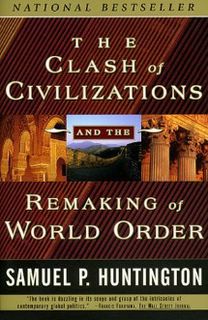 Historically Speaking After more than a millennium, when the Muslim world was attacking, invading, conquering Europe, the tables have turned, and since then they have been at the receiving end of imperial expansion, instead of conducting it themselves, and they have lost battle after battle, war after war. Thus that indeed is one of the main causes of the discontents at the present time. Read more ... *Western Impact and Middle Eastern Response In the United States, the Bush administration is busy terrorizing Americans. There will be nuclear attacks, bombs in high-rise apartment blocks, on the Brooklyn bridge, men with exploding belts - note how carefully the ruthless Palestinian war against Israeli colonization of the West Bank is being strapped to America's ever weirder "war on terror" - and yet more aircraft suiciders. If you read the words of President Bush, Vice-President Dick Cheney and the ridiculous national security adviser, Condoleezza Rice, over the past three days, you'll find they've issued more threats against Americans than Mr bin Laden.  The growing evidence that Israel's policies are America's policies in the Middle East - or, more accurately, vice versa - is now being played out for real in statements from Congress and on American television. First, we have the chairman of the US Senate Foreign Relations Committee announcing that Hizbollah - the Lebanese guerrilla force that drove Israel's demoralized army out of Lebanon in the year 2000 - is planning attacks in the US. After that, we had an American television network "revealing" that Hizbollah, Hamas and al- Qa'ida - Mr bin Laden's organization- have held a secret meeting in Lebanon to plot attacks on the US. American journalists insist on quoting "sources" but there was, of course, no sourcing for this balderdash, which is now repeated ad nauseam in the American media.  Then take the "Syrian Accountability Act" that was introduced into the US Senate by Israel's friends on 18 April. This includes the falsity uttered earlier by Israel's Foreign Minister, Shimon Peres, that Iranian Revolutionary Guards "operate freely" on the southern Lebanese border. Now there haven't been Iranian Revolutionary Guards in Lebanon - let alone the south of the country - for 18 years. So why is this lie repeated yet again? Iran is under threat. Lebanon is under threat. Syria is under threat - its "terrorism" status has been heightened by the State Department - and so is Iraq. But Ariel Sharon, the Israeli Prime Minister held personally responsible by Israel's own inquiry for the Sabra and Shatila massacre of 1,700 Palestinians in Beirut in 1982, is - according to Mr Bush - "a man of peace". How much further can this go? A long way, I fear. 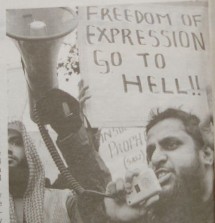 The anti-American feeling throughout the Middle East is palpable. Arab newspaper editorials don't come near to expressing public opinion. In Damascus, Majida Tabbaa has become famous as the lady who threw the US Consul Roberto Powers out of her husband's downtown restaurant on 7 April . "I went over to him," she said, "and told him, 'Mr Roberto, tell your George Bush that all of you are not welcome - please get out'." Across the Arab world, boycotts of American goods have begun in earnest.  How much longer can this go on? America praises Pakistani President Musharraf for his support in the "war on terror", but remains silent when he arranges a dictatorial "referendum" to keep him in power. America's enemies, remember, hate the US for its "democracy". So is General Musharraf going to feel the heat? Forget it. My guess is that Pakistan's importance in the famous "war on terror" - or "war for civilization" as, we should remember, it was originally called - is far more important. If Pakistan and India go to war, I'll wager a lot that Washington will come down for undemocratic Pakistan against democratic India.  Across the former Soviet southern Muslim republics, America is building air bases, helping to pursue the "war on terror" against any violent Muslim Islamist groups that dare to challenge the local dictators. Do not for a moment think that these oil and gas-rich lands have any economic importance for the oil-fueled Bush administration. Nor the pipelines that could run from northern Afghanistan to the Pakistani coast if only that pesky Afghan loya jirga could elect a government that would give concessions to Unocal, the oddly named concession whose former boss just happens to be a chief Bush "adviser" to Afghanistan.  Now here's pause for thought. If anyone had said prior to 11 September that Arabs were plotting a vast scheme to murder thousands of Americans in the US, no one would have believed them. We would have charged that this was an attempt to incite the American people against Arabs and Muslims. And rightly so. But Arabs did commit the crimes against humanity of 11 September. And many Arabs greatly fear that we have yet to see the encore from the same organization. In the meantime, Mr Bush goes on to do exactly what his enemies want; to provoke Muslims and Arabs, to praise their enemies and demonize their countries, to bomb and starve Iraq and give uncritical support to Israel and maintain his support for the dictators of the Middle East. 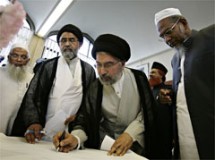 There is a firestorm coming. And we are blissfully ignoring its arrival; indeed, we are provoking it. Read more ... *Bush's Rhetoric The Muslim world is turning increasingly to theocracy, with all of its strictures on speech and action, medieval punishments and the like.That American policies - 'regime change' in the Middle East - are not achieving their ends. These millions of voters were preferring Islam to the corrupt regimes we imposed on them. Read more ... *Fish in a Barrel The Kuwaiti-Iraqi crisis developed as a result of the fact that the ruling elites in the two Arab states represented two conflicting ideologies. In this inter-Arab conflict, the Iraqi Ba'ath Party represented an ideology close to socialist ideologies in Western societies. The ruling class in Kuwait represented a quasi-feudal ideology according to which members of the royal family control the country's major resources, allow their loyal subjects to have access to them, and deny them to others. 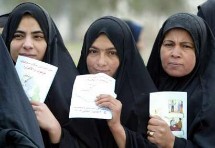 While followers of different ideologies, such as liberalism and conservatism in the United States and other industrial societies, alternate the exercise of power peacefully by accepting results of elections, this has not happened yet in the Arab Middle East. Some Arab states do not have multi-party elections, others do not have elections at all. In addition to that, rivalry between Arab states intensifies these ideological differences. Consequently, the 1990 Iraqi invasion of Kuwait can be better understood if it is analyzed as a result of a conflict between two different ideologies in the absence of a unified and democratic Arab homeland. Between 1922 and 1975, Iraqi Kurds revolted several times against the Iraqi central government receiving assistance first from the British then from the United States and Israel.  Peace in Iraq lasted only about five years, between 1975 and 1980, then the Iran-Iraq war started and continued until 1988. That war was closely related to the Kurdish problem because it started as a result of canceling the 1975 Iraqi-Iranian treaty, which ended the Kurdish rebellion. By the time the Iran-Iraq war ended in 1988, Iraq was about $90 billion in debt and in need for money to rebuild its economy. The decline in oil prices did not help the Iraqi plans for reconstruction. Thus, the 1990 economic distress, that Iraq found itself in, was caused originally by the eight-year war with Iran and the longer war with the Kurds. In addition to oil interests, the Western power elites have an interest in keeping militarism alive and well. For a few months, in 1989 and 1990, the downfall of the Soviet Union deprived the military industries in the West from the major justification of keeping the military spending as high as possible. In the United States, people even started talking about peace dividends. The Iraqi invasion of Kuwait was a golden opportunity for the military industries and their constituents among the power elites to argue for the continuation of the high military spending. Thus, as one Cold War was over, another was aggressively argued for. After all, the Cold War was a big business. In the United States alone, the cost of the Cold War reached about $12.8 trillion between 1945 and 1990. Read more ... *The Gulf War:Overreaction & Excessiveness There were forces at work, deep in Arab and Muslim societies, which would no longer submit to a skewed order devised solely to preserve American interests. 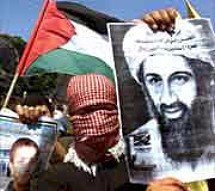 These forces were progressive. They would not only undermine the old order; they would construct a new order that would raise up and empower the excluded: workers, women, students, intellectuals, refugees. In the case of Lebanon, the resistance to Israeli occupation did form across a very wide front, and all of the organizations used suicide bombings: the Islamist Hezbollah, the Shiite sectarian Amal, and the pro-Syrian secular Syrian Social Nationalist Party (SSNP). Ayatollah Muhammad Husayn Fadlallah, when he was still the spiritual mentor of Hezbollah, contributed crucially to that breakthrough. This quote is an example of the conceptual leap that inaugurated the attacks: “What is the difference between setting out for battle knowing you will die after killing ten [of the enemy], and setting out to the field to kill ten and knowing you will die while killing them? There is no difference between dying with a gun in your hand or exploding yourself.”  Since the 1920s, the expansion of the Jewish presence has prompted repeated, spontaneous uprisings—most notably from 1936 to 1939 and again from 1987 to 1990. Much blood was split, yet there were no suicide bombings. Hamas itself, which played an important role in the first intifada, did not resort to them. But ending the occupation is not the prime objective of the suicide campaign. The Palestinian bombings are spectacles intended to win over converts and build an identity over time. 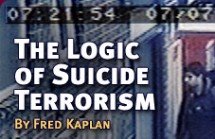 Al-Qaeda is meant to be the sum of all Muslim grievances, which can only be redressed through the spectacular humiliation of America and its allies, wherever and whenever possible. It is about who we are, and what we do, and what we have, and what they are not. To say now that it has but limited goals, fixed upon some territory, is to trivialize it. Whatever posture the U.S. assumes, however near or far it will stand, we will still face a globalized jihad to push us back still further. The very fact that we are the balancer, at whatever distance, will make us a target. This is the price of hegemony. It underestimates our adversaries to think they will forget about us if they cannot see the whites of our soldiers' eyes.  They, like us, can see over the near horizon. They have a global vision, and a global reach. Read more ... *Suicide Terrorism *What can terrorists teach us? 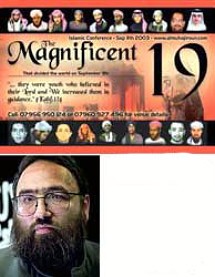 Labels: Armageddon, Bible Prophecy, Bush Brotherhood of Death  Stumble It! Stumble It! |









































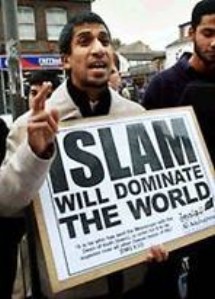







Comments on "Firestorm Coming"
post a comment